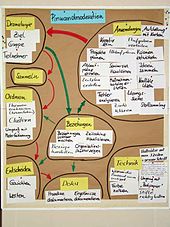Moderation (group work)
Moderation is a method of working together in groups, supported by a moderator . The aim is to create a common learning process with all group members. The mastery of moderation methods belongs to the standard repertoire of every group trainer. Moderation methods are used, for example, in organizational development , in seminars and conferences, congresses and meetings, in meetings and in project and quality management , in schools, in pedagogy and in adult education .
Group dynamic background
Moderation aims to promote the creativity of the participants, to make ideas accessible to everyone, to arrive at results and decisions together , which are supported and implemented by consensus by the whole group . Participants must be involved in the entire group process so that they are committed, can solve specific tasks, can realize their own interests and work largely freely. The atmosphere, the roles in the group, the openness and the handling of divergent opinions are also important for success .
Methods
Moderation methods activate all participants in a targeted manner. In response to a question, the participants write arguments on pink cards or mark their priorities with adhesive dots. Here is a selection of the most important methods:
Pin board, cards and pins
Cards with short texts are freely arranged on a large-format plug-in wall covered with wrapping paper. They are pinned there with needles and can thus be rearranged again and again in the course of the discussion. This technique is also known as the metaplan method .
flipchart
For example, the program for the day is listed on the flipchart, or the result is summarized at the end, or the next work steps are specified in a to-do list (who does what by when with whom).
Large group moderation
Large group moderation is a socio-psychological method to control large planning and decision-making groups of 50 to 200 (or even up to 1000) participants in a large meeting room (moderation) in such a way that they achieve realizable results in a short time, typically 2 to 3 days come. Areas of application are companies, organizations, administrations, cities and municipalities, citizen participation, etc.
Online moderation
Online workshops are conducted over the Internet. An electronic meeting system (EMS) is used that provides the participants with electronic tools that support the forms of interaction known from traditional workshops such as brainstorming ( brainwriting ), categorization, voting and discussions. Classic blockades of group work are technically lifted through (optional) anonymization and parallelization of the contributions. The advantages of computer-based workshops increase with the number of participants.
The EMS is controlled by a moderator. Synchronous online workshops are regularly supplemented by a telephone or web conference .
See also
literature
- Primary sources
- Wolfgang Schnelle: Interactional Learning - Change in Further Education . Metaplan , Quickborn 1978.
- Eberhard Schnelle (Ed.): Metaplan conversation technique. Communication tool for group work. Revised new edition Quickborn, Metaplan 1982, ( Metaplan series 2).
- Karin Klebert, Einhard Schrader, Walter Straub: Moderation method. Shaping the formation of opinions and will in groups that learn, live, work and play together. 5th edition. Windmühle Verlag, Hamburg 1991, ISBN 3-922789-18-8 .
- Telse Schnelle-Cölln, Eberhard Schnelle: Visualization in moderation. A practical guide for group work and presentation . Windmühle Verlag, Hamburg 1998, ISBN 3-922789-50-1 , ( moderation in practice 5).
- Josef W. Seifert : Visualize, present, moderate. German - English - French . 40th edition. Gabal, Offenbach 2018, ISBN 3-86936-240-5
- Other sources
- Michele Neuland: Neuland moderation . 5th edition. Manager Seminars, 2005, ISBN 978-3-931488-27-7
- Jürgen Engel: Art in management training . In: Workshop of Change . Report '92. Metaplan, Quickborn 1992.
- Joachim Freimuth, Fritz Straub (Ed.): Democratization of Organizations. Philosophy, origins and perspectives of the Metaplan idea . Festschrift for Eberhard Schnelle on his 75th birthday. Gabler, Wiesbaden 1996, ISBN 3-409-18922-X .
- Ulrich Martin Drescher : Large forms of moderation . In: Sabina Bolender (ed.): Management trainer . Campus, Frankfurt am Main u. a. 1998, ISBN 3-593-35903-0 .
- Joachim Freimuth: Moderation in university didactics. Concepts and experiences in university teaching and university development . Windmühle, Hamburg 2000, ISBN 3-922789-62-5 , ( moderation in practice 3).
- Béatrice Hecht-El Minshawi , Jürgen Engel (ed.): Living in cultural diversity = Managing Cultural Diversity . Going other ways - discovering new things . Kellner, Bremen 2006, ISBN 3-927155-51-9 ( documentation of a moderated workshop series ).
- Josef W. Seifert: Moderating meetings successfully . Gabal, Offenbach 2007, ISBN 978-3-89749-290-5 .
Web links
- Mediation & moderation in urban and regional development (online article by Anja Terpitz)
Individual evidence
- ↑ J. Nunamaker, AR Dennis, JS Valacich, DR bird, JF George: Electronic Meeting Systems to Support Work Group . In: Communications of the ACM , Vol. 34, 1991, No. 7, pp. 40-61
- ^ ES McFadzean: Improving Group Productivity with Group Support Systems and Creative Problem Solving Techniques . In: Creativity and Innovation Management , Vol. 6, 1997, No. 4, pp. 218-225.


